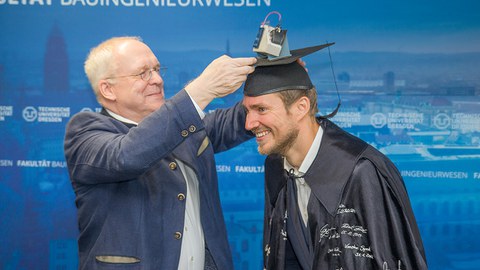Sep 30, 2024
Promotion Dominik Schlüter

Dominik Schlüter receives his doctorate from Prof. Manfred Curbach
On 25.09.2024, Dipl.-Ing. Dominik Schlüter successfully defended his doctoral thesis on the topic of "Thin panel elements made of carbon concrete with integrated electricity storage modules - development pro-cess and potential analysis". In addition to the chairman of the doctoral committee, Prof. Dr. Robert Jockwer (TU Dresden), Prof. Dr. Manfred Curbach (TU Dresden) and Prof. Dr. John Grunewald (TU Dresden) were present as reviewers.
Abstract:
With the shift to renewable and decentralized energy supply, buildings are increasingly as-suming roles in energy generation, storage and management. To ensure this transformation of the energy supply landscape is economically, ecologically, and socially beneficial, the development of sustainable energy storage solutions at building level is essential.
The use of modular precast concrete elements can offer significant economic and ecological benefits compared to conventional on-site construction methods. This study investigates the technical feasibility and ecological and economic viability of integrating electrical energy storage into prefabricated building elements. The research focused on several key objectives: i) Developing a suitable component design, which included a robust construction concept, appropriate material selection, energy storage options, and a potential production chain. ii) Experimentally examining and discussing this design proposal based on essential characteristic values, assessing its structural, manufacturing, and ecological properties. iii) Identifying and exploring optimization potentials, leading to the development of an appropriate manufacturing technology and building concept.
Supercapacitors are potent energy storage devices that, compared to lithium-ion batteries, exhibit high long-term stability, superior power density, and a wide operating temperature range (-40 to +80 °C). They can be constructed using sustainable, recyclable, and locally available materials. However, their low energy density requires the use of larger quantities of material to achieve adequate storage capacitiy. This study explores accommodating the storage material within a prefabricated concrete slab in areas of minimal static relevance.
A cassette construction made out of carbon concrete proved to be a suitable form of integration. Carbon concrete, with its flexible and corrosion-resistant reinforcement and flowable, predominantly high-strength concrete matrix, meets the technical and material requirements for integration of supercapacitors.
Application-oriented component tests validated the feasibility of a storage-integrated façade panel in terms of manufacturability, mountability and load-bearing capacity of the overall system. The comparison with conventional Li-ion batteries using life cycle analysis showed a reduction in global warming potential, which is due in particular to the sustainable production of supercapacitors and depends largely on the application scenario and the associated choice of materials. The design and manufacturing approach presented here can offer sustainable solutions for both the construction and energy sectors.
We would like to congratulate Dominik Schlüter on completing his doctorate and wish him all the best and every success in his future endeavors.
